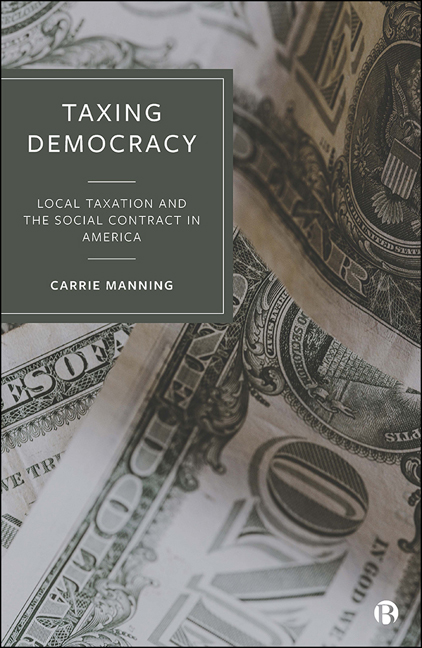Book contents
- Frontmatter
- Contents
- Acknowledgments
- 1 Taxes and the Social Contract
- 2 States, Taxes, and the Polities They Create
- 3 The US Tax State and the Limited Social Contract
- 4 Tax and Expenditure Limitations vs. an Expanding Social Contract
- 5 Implications of the Reliance on Fines and Fees
- 6 Taxing Democracy: Conclusions
- Notes
- References
- Index
2 - States, Taxes, and the Polities They Create
Published online by Cambridge University Press: 20 January 2024
- Frontmatter
- Contents
- Acknowledgments
- 1 Taxes and the Social Contract
- 2 States, Taxes, and the Polities They Create
- 3 The US Tax State and the Limited Social Contract
- 4 Tax and Expenditure Limitations vs. an Expanding Social Contract
- 5 Implications of the Reliance on Fines and Fees
- 6 Taxing Democracy: Conclusions
- Notes
- References
- Index
Summary
Introduction
This chapter examines the concepts of ‘social contract’ and ‘tax bargain’ as they have been used to explain state formation and the development of lasting patterns of political and economic development. It sets out the processes and mechanisms through which a historical social contract can be reproduced and carried forward over time. It draws on theories and concepts from public economics, comparative politics, political theory, and fiscal sociology to show a surprisingly broad shared understanding in these different scholarly traditions about how taxation is tied to state formation and governance across regime types and throughout history.
Moreover, there is substantial support across disciplinary boundaries – especially history, sociology, and political science – for the idea that tax policy reflects relationships of political, social, and economic power at the time of the consolidation of states’ authority over their territory and those that live there. Political scientists, historians, and sociologists have shown how the design of political institutions can perpetuate inequities (intentionally or not) by generating positive returns to political strategies that maintain existing power structures long after the original conditions that produced them have disappeared. The same is true of tax bargains, and tax bargains and the policies they engender have much to do with persistent disparities in wealth along racial lines.
Tax bargains set during a time when full political and economic rights were denied to Black Americans have much to do with these gaps (Moran and Whitford, 2009; Strand and Mirkay, 2019; Hannah-Jones, 2020; McGhee, 2021; Brown, 2021). The tax bargains forged when the federal government and state governments were consolidated predated full democracy in America and were designed to serve the interests of a much more narrowly defined political community than the one it must serve today. The social contract can be, and has been, expanded through a combination of political mobilization, social action, and electoral politics. Chapter 3 discusses these ‘critical junctures,’ when the social contract expands but then is straitjacketed by the existing tax bargain that is too restrictive to fund it. The tax bargain is then used by political actors to construct a legitimizing narrative in which it is held up as embodying the ‘true’ values of the polity.
- Type
- Chapter
- Information
- Taxing DemocracyLocal Taxation and the Social Contract in America, pp. 16 - 38Publisher: Bristol University PressPrint publication year: 2023



